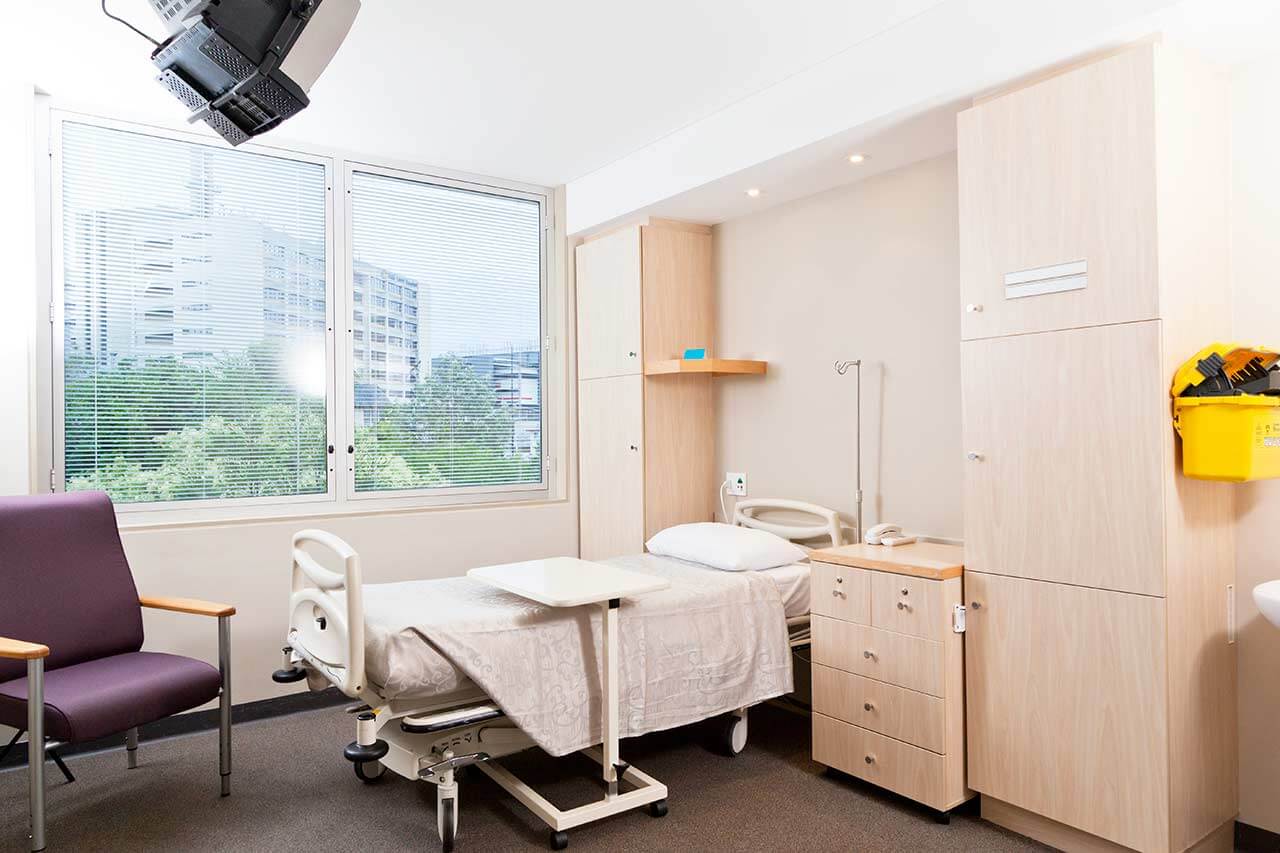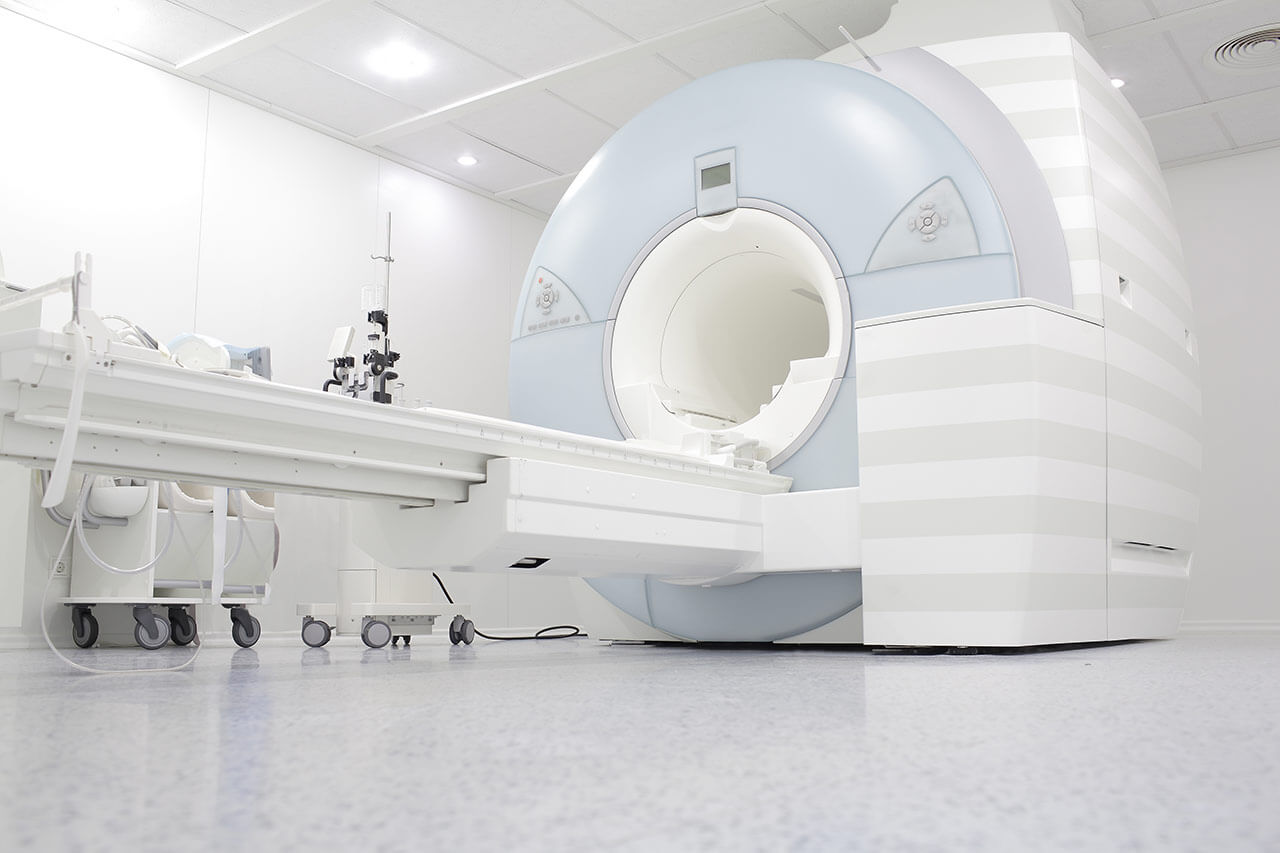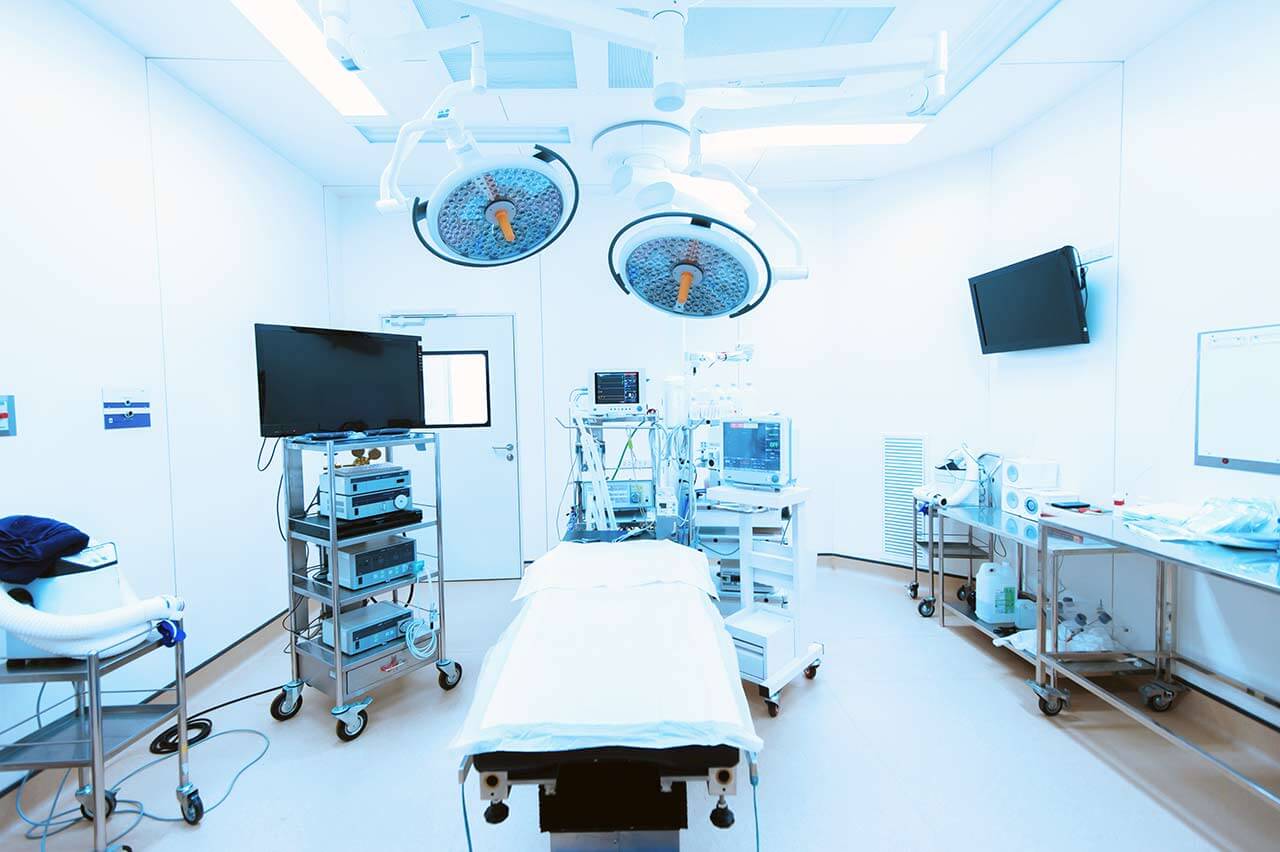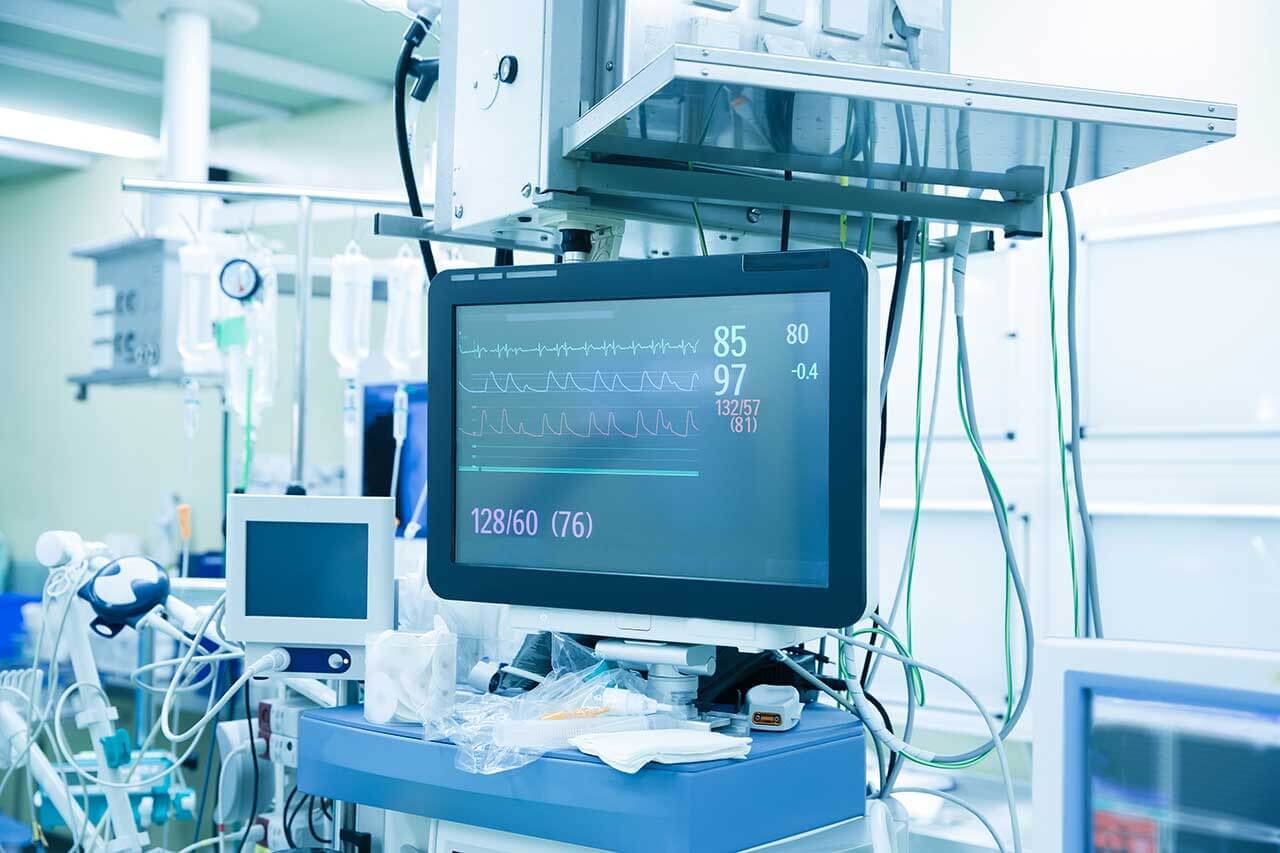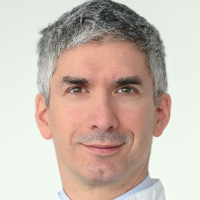
The program includes:
- Initial presentation in the clinic
- clinical history taking
- physical examination
- laboratory tests:
- complete blood count
- biochemical analysis of blood
- indicators of inflammation
- indicators blood coagulation
- ophthalmologic examination:
- ophthalmoscopy
- gonioscopy
- pachymetry
- perimetry (visual field test)
- computerperimetry
- Goldmann-primetry
- fluorescein angiography
- thermography
- capillary microscopy
- testing for optic nerve damage
- tonometry
- intraocular pressure measurement
- preparation according to preoperative standard
- treatment of congenital glaucoma with total or basal iridectomy
- symptomatic treatment
- cost of required medications
- nursing staff services
- elaboration of further recommendations
Required documents
- Medical records
Service
You may also book:
 BookingHealth Price from:
BookingHealth Price from:
About the department
The Department of Adult and Pediatric Ophthalmology at the University Hospital Rechts der Isar Munich offers the full range of modern diagnostic and therapeutic services in the field of its expertise. The department deals with the treatment of all pathologies of the anterior and posterior segment of the eye. Special attention is paid to operations on the retina, vitreous body, lens and treatment of corneal diseases. To provide effective treatment, the department has three modern operating rooms and two treatment rooms equipped with the very latest technology. The department has 24 beds. Most of the diagnostic and therapeutic procedures are performed on an outpatient basis, without mandatory hospitalization. The department's medical team admits more than 2,500 inpatients, and about 25,000 outpatients for diagnostics and treatment annually. The department’s specialists have long successful experience and they also deal with the most complex clinical cases. They provide effective treatment that meets the highest European standards. The department is headed by Prof. Dr. med. Peter Charbel Issa.
The department offers the widest diagnostic options: visual field tests, retinal testing using special cameras, fluorescein angiography, optical coherence tomography-angiography, ophthalmoscopy, keratotopography, pachymetry, Heidelberg retinal tomography and many other modern tests, allowing for the comprehensive assessment of the eye condition, establishment of an accurate diagnosis and prescription of the optimal treatment regimen.
It should be noted that the department has specialized outpatient clinics for the treatment of particular diseases, for example, an outpatient clinic for glaucoma, a center for treating patients using intravitreal injections. The patients are also provided with round-the-clock care for emergencies, even on weekends and holidays.
The department is involved in national and international clinical research, as well as in interdisciplinary collaboration to develop new diagnostic and therapeutic techniques in the field of ophthalmology. At the moment, the department 's Clinical Research Center carries out research to develop new conservative treatments for age-related macular degeneration (wet and dry type), diabetic macular edema, macular edema due to vein occlusion. At the same time, the focus is on the research of new medications and the search for new treatment methods.
The department's main clinical focuses include:
- Diagnostics and treatment of tear duct diseases
- Diagnostics and treatment of eye injuries
- Diagnostics and treatment of diseases affecting the conjunctiva and cornea (including dry eye syndrome)
- Refractive eye surgery
- Diagnostics and treatment of age-related hyperopia
- Corneal transplantation
- Diagnostics and treatment of cataracts (including implantation of special lenses)
- Diagnostics and treatment of glaucoma
- Diagnostics and treatment of age-related macular degeneration
- Diagnostics and treatment of pathological changes in the retina caused by diabetes mellitus
- Diagnostics and treatment of retinal detachment
- Diagnostics and treatment of ophthalmic diseases in children
- Diagnostics and treatment of neuro-ophthalmic diseases
- Orthoptics
- Diagnostics and treatment of eyelid diseases
- Blepharoplasty
- Diagnostics and treatment of other diseases
The department's range of medical services includes:
- Conservative and surgical treatment of corneal and conjunctival diseases
- Crosslinking
- Refractive eye surgery using excimer laser (PRK, LASIK, Femto-LASIK, Epi-LASIK, LASEK)
- Excimer laser phototherapeutic keratectomy
- Corneal transplantation, including lamellar keratoplasty using a femtosecond laser, DMEK
- Tumor resection
- Pterygoid hymen resection with and without conjunctival plastic surgery
- Triple procedure: corneal transplant, cataract surgery, IOL implantation
- Selection of contact lenses
- Drug therapy
- Conservative and surgical treatment of lens diseases, including cataracts
- Phacoemulsification
- Femtolaser lens surgery
- Intracapsular lens resection
- Extracapsular lens resection
- Pars plana vitrectomy
- YAG laser capsulotomy (as follow-up therapy)
- Posterior chamber intraocular lens implantation
- Removal of a foreign body from the lens
- Lens revision interventions
- Secondary IOL implantation
- Implantation of monofocal, multifocal, toric, yellow and aspherical intraocular lenses
- Conservative and surgical treatment of vitreous and retinal diseases
- ARGUS II (retinal replacement technique for retinitis pigmentosa)
- Argon laser therapy
- Focal and panretinal laser therapy
- Photodynamic therapy
- Laser retinopexy
- Intravitreal injection therapy (triamcinolone, lucentis, eylea, avastin)
- Cryopexy
- Pneumatic retinopexy
- Pars plana vitrectomy
- Subretinal surgery (for example, choroidal neovascularization coagulation for subretinal hemorrhage)
- Endotamponades (air, gas, silicone oil)
- Transconjunctival sutureless vitrectomy (23G)
- Conservative and surgical treatment of glaucoma
- Nd:YAG laser iridotomy
- Iridoplasty
- Selective laser trabeculoplasty
- Trabeculectomy (with and without 5FU)
- Cycloryocoagulation
- Cyclophotocoagulation
- Deep sclerectomy
- Application of ExPress shunts, XEN and Ahmed implants
- Drug therapy (local or systemic)
- Conservative and surgical treatment of ophthalmic diseases in children
- Surgical treatment of cataracts
- Surgical and laser therapy for retinopathy of prematurity
- Surgical treatment of eye injuries
- Treatment with diode and argon laser
- Conservative and surgical therapy for strabismus
- Selection of lenses
- Conservative and surgical treatment of tear duct diseases
- Annular intubation
- Tear duct endoscopy
- Toti's procedure (dacryocystorhinostomy)
- Tear duct puncture
- Lacrimal duct reconstruction
- Tear duct dilatation
- Conjunctival dacryorhinostomy
- Tear duct flushing
- Tear duct probing
- Drug therapy for inflammation
- Tear sac massage
- Conservative and surgical treatment of eyelid diseases
- Skin resurfacing (Erbium YAG laser)
- Xanthelasma eyelid treatment (Erbium YAG laser)
- Superficial removal of skin pigmentation (Erbium YAG laser)
- Argon laser epilation
- Electrolysis
- Cryoepilation
- Ptosis correction
- Ectropion, entropion correction
- Blepharoplasty
- Reconstructive surgery for injuries
- Tarsorrhaphy
- Surgical removal of eyelid tumors followed by plastic surgery with free grafts or rotation flaps
- Chalazion removal
- Botulinum toxin therapy for blepharospasm or corneal ulcer
- Drug therapy for inflammatory eyelid lesions
- Conservative and surgical treatment of neuro-ophthalmic diseases
- Eyelid surgery, ptosis correction
- Tarsorrhaphy
- Drug therapy
- Conservative and surgical treatment of orbital diseases
- Eye socket surgery
- Enucleation with and without follow up implantation
- Placement of secondary implants
- Tumor biopsy
- Tumor resection
- Orbitotomy
- Other types of conservative and surgical treatment
Curriculum vitae
Higher Education and Professional Career
- 1995 - 2002 Medical studies in Jena, Freiburg, and London; German Academic Exchange Service (DAAD) scholarship.
- 2003 Thesis defense, Friedrich Schiller University Jena.
- 2003 - 2008 Physician (as part of preparation for board certification), Department of Ophthalmology at the University Hospital Wuerzburg and the University Hospital Bonn.
- 2005 ECFMG examination (Educational Commission for Foreign Medical Graduates).
- 2008 Board certification in Ophthalmology, European Board of Ophthalmology (EBO) and International Council of Ophthalmology (ICO).
- 2008 - 2009 GEROK Scholarship.
- 2009 - 2011 Marie Curie Research Fellowship, Nuffield Laboratory of Clinical Neuroscience, University of Oxford.
- 2010 Habilitation.
- 2014 PhD in Ophthalmology, Nuffield Laboratory of Clinical Neuroscience, University of Oxford.
- 2012 - 2016 Senior Physician, Department of Ophthalmology, University Hospital Bonn; Coordinator for Ophthalmology, Center for Rare Diseases, University Hospital Bonn.
- 2016 - 2024 Consultant Ophthalmologist, Oxford Eye Clinic as part of the Oxford University Hospitals.
- 2021 Professorship for Ophthalmology, University of Oxford.
- Since 04.2024 Head Physician, Department of Adult and Pediatric Ophthalmology at the University Hospital Rechts der Isar Munich.
Photo of the doctor: (c) Klinikum rechts der Isar der Technischen Universität München
About hospital
The University Hospital Rechts der Isar Munich was founded in 1834. It combines long traditions with the very latest advances in modern medicine. The medical facility includes 33 specialized departments and 20 interdisciplinary centers, where patients can receive top-class medical care in all medical fields.
The hospital annually admits more than 65,000 inpatients for diagnostics and treatment, and about 250,000 outpatients receive effective medical care. The hospital also performs more than 40,000 surgical procedures every year, and about 2,100 babies are born here annually. One of the most significant achievements of the medical facility can be called the first transplantation of both arms above the elbow performed in 2008. The surgery that lasted 15 hours, and in which 40 doctors of various medical specialties took part, became a real sensation in the scientific world. Thanks to a unique surgical procedure, the doctors managed to give the patient new hands.
In addition, the employees of the hospital are actively involved in research activities, in which they study various diseases, as well as develop new therapeutic options for their treatment. It should be noted that the research institutes of the hospital are among the most reputable research organizations in the world. A striking example can be considered the Roman Herzog Comprehensive Cancer Center, whose specialists cooperate closely with the Comprehensive Cancer Center Munich in order to find new treatment methods for cancers.
The university hospital has a strict quality management system to maintain a high level of patient care. Since 2011, the hospital has been certified in accordance with DIN EN ISO 9001:2015 at the national and international level. The medical facility was also recertified by TÜV Rheinland in 2020.
The hospital annually provides medical services not only to German citizens, but also to thousands of patients from different countries of the world. This indicates that the hospital has an excellent reputation in the international medical arena and takes on the most complex clinical cases where other medical centers are unable to help the patient.
Photo: (с) depositphotos
Accommodation in hospital
Patients rooms
The patients of the University Hospital Rechts der Isar Munich live in comfortable single and double rooms with modern design. An accompanying person may stay with the patient in the single room. All patient rooms have an ensuite bathroom with shower and toilet. The furnishings of a standard patient room include an automatically adjustable bed, a bedside table for personal belongings, a table and chairs for receiving visitors, a wardrobe, a telephone and a TV. The patient rooms also have Wi-Fi.
The hospital also has enhanced-comfort rooms, corresponding to the level of a high-end hotel. Such patient rooms have additional amenities: a safe, a mini fridge and upholstered furniture.
Meals and Menus
The patients of the hospital are offered a balanced and healthy three meals a day: breakfast, lunch and dinner. The patients have a choice of three different menus for lunch – a classic full menu, as well as a dietary and vegetarian one. When cooking meals, the chefs comply with the current recommendations of the German Society for Nutritional Medicine (DGEM) and the German Nutrition Society (DGE).
If for some reason you do not eat all the foods, you will be offered an individual menu. The hospital also houses a cafeteria with a large assortment of hot and cold drinks, snacks and desserts.
Further details
Standard rooms include:
Religion
Religious services are available upon request.
Accompanying person
Your accompanying person may stay with you in your patient room or at the hotel of your choice during the inpatient program.
Hotel
You may stay at the hotel of your choice during the outpatient program. Our managers will support you for selecting the best option.
The hospital offers a full range of laboratory tests (general, hormonal, tests for infections, antibodies, tumor markers, etc.), genetic tests, various modifications of ultrasound scans, CT scans, MRI and PET / CT, angiography, myelography, biopsy and other examinations. Treatment with medications, endoscopic and robotic operations, stereotaxic interventions is carried out here, modern types of radiation therapy are also used. The hospital offers patients all the necessary therapeutic techniques.
- CAR T-cell therapy
- Autologous and allogeneic bone marrow transplantation
- Transcatheter aortic valve implantation (TAVI)
- Radical and organ-preserving interventions for kidney cancer
- Iridoplasty and iridotomy with Nd-YAG laser
These are acute and chronic leukemias, solid malignant tumors, heart failure, cardiac arrhythmias, heart valves stenosis and insufficiency, vasculitis, benign prostatic hyperplasia, pathologies of retina and vitreous body, Guillain-Barré syndrome, myasthenia gravis and other pathologies.
- Hematology and oncology
- Cardiology
- Nephrology
- Urology
- Ophthalmology
Over 877 highly qualified physicians work at the hospital.
